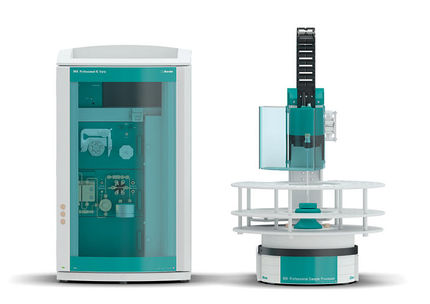To use all functions of this page, please activate cookies in your browser.
my.chemeurope.com
With an accout for my.chemeurope.com you can always see everything at a glance – and you can configure your own website and individual newsletter.
- My watch list
- My saved searches
- My saved topics
- My newsletter
Gallium scanA gallium scan or gallium 67 scan is a type of nuclear medicine study that uses a radioactive tracer to obtain images of a specific type of tissue, or disease state of tissue. Gallium salts like gallium citrate and gallium nitrate are used. The form of salt is not important, since it is the freely dissolved gallium ion Ga+3 which is active. For these applications, the radioactive isotope 67Ga is used. The body generally handles Ga+3 as though it were ferric, and thus it is bound (and concentrates) in areas of inflammation such as an infection site, and also areas of rapid cell division. This allows such sites to be imaged by nuclear scan techniques. Product highlightIn the past, the gallium scan was the standard for cancer diagnosis and staging until it was replaced by positron emission tomography. It is still used to image inflammation and infection. The gallium scan has an advantage over indium-111 labeled leukocytes scan in imaging osteomyelitis (bone infection) of the spine, lung infections and inflammation, and chronic infections. Indium-111 labeled leukocytes scan is better for osteomyelitis that does not involve the spine, abdominal and pelvic infections, and acute infections. Both the gallium scan and indium-111 labeled leukocytes scan may be used to image fever of unknown origin (elevated temperature without an explanation). After the tracer has been injected, images are taken by a gamma camera at 24, 48, and in some cases, 72, and 96 hours later. Each set of images takes 30-60 minutes, depending on the size of the area being imaged. The resulting image will have bright areas that collected large amounts of tracer, because inflammation is present or rapid cell division is occurring. Single photon emission computed tomography (SPECT) images may also be acquired. In some imaging centers, SPECT images may be combined with computed tomography scan using either fusion software or SPECT/CT hybrid cameras to obtain both physiological information from the gallium scan and anatomical information from the CT scan. Homeland Security Crossing the U.S. border two weeks after a gallium 67 scan will alert the border guard to the presence of radioactive isotopes in your vehicle. Categories: Nuclear medicine | Gallium |
| This article is licensed under the GNU Free Documentation License. It uses material from the Wikipedia article "Gallium_scan". A list of authors is available in Wikipedia. |







